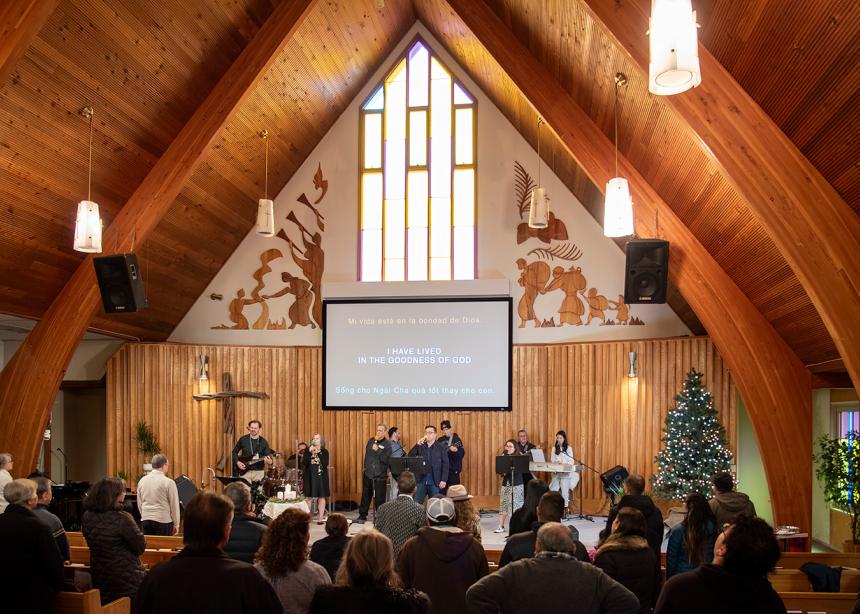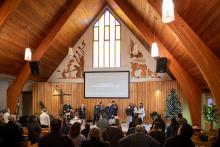Mennonite Church Canada is pleased to announce Emissions Reduction Grants (ERG) totaling $23,021 to help one rural and eight urban congregations reduce their carbon footprint. Fourteen additional congregations expressed interest in the program.
Sandy Plett, climate action coordinator and member of the Sustainability Leadership Group (SLG), which oversees the process, said they were delighted by the strong response in the first year of the program.
The smallest grant was $1,341, and the largest grants were capped at $3,000. The grantees include Sherbrooke Mennonite in Vancouver; First Mennonite and Holyrood Mennonite, both in Edmonton; Listowel Mennonite and Toronto United Mennonite in Ontario; and Lowe Farm Bergthaler, Jubilee Mennonite, Fort Garry Mennonite Fellowship and Home Street Mennonite in Manitoba.
Four congregations (Sherbrooke, First, Lowe Farm, Listowel) will use the funds to install more energy efficient lighting, which will not only reduce direct electricity consumption but also reduce cooling costs in the hotter seasons. Others (Jubilee, Fort Garry, Home Street) will upgrade insulation, windows or ventilation systems to reduce heat loss in the cold seasons.
One congregation (Holyrood) will make kitchen and water heating appliance upgrades to reduce energy consumption. Toronto United Mennonite will use the grant as seed money for long-range plans to install heat pumps to replace aging natural gas furnaces, among other upgrades.
Applicants were asked how their congregation will share their vision for green energy with their community. First Mennonite in Edmonton, which will upgrade its lighting, noted the presence of its solar panels at a major intersection already “gives witness to our vision of being good stewards of our planet and reducing our emissions.”
Lowe Farm Bergthaler, a congregation in rural Manitoba, wrote: “We hope to continue to be an outreach in our community for many years to come. To this end we must be responsible in our energy consumption as an example to those around us.”
Jubilee, which provides numerous social services in its north Winnipeg neighbourhood, said there are many opportunities to “communicate the green energy plans at either large events like a Christmas dinner or via the smaller regular based programs such as the community kitchen, the community garden or women’s programs.”
The SLG was pleased that the grant process kick-started conversations about emissions reductions in numerous congregations. “Many of the applicants said this really was the boost they needed to get the conversation going, or move it to its next step,” said Plett.
The initial plan was to cap grants at $6,000 or 50 percent of the cost per applicant, but the number of applicants was much higher than anticipated. It made sense to lower the cap to help more congregations.
For churches considering an application next year, the SLG encourages congregations to start the conversation soon. Plett recommends God's Green Church: Becoming a Creation Care Congregation—available for free from CommonWord—as a useful resource. She encourages facilities committees to contact any of the churches who received a grant this year. “If that church is in your area, go and see what they did, and ask them why they did it.”
Plett says churches need to “start normalizing” conversations about buildings and emissions. “It’s not just about your building, it’s about the broader picture of how your church responds faithfully in a time of crisis.”
Plett said the SLG was pleased so see how many of the applicants share their buildings with multiple groups. “The people who care for these places really want them to be used. It makes me feel proud to be part of a community that shares their space and looks after it.”
Doug Klassen, executive minister for MC Canada, said that generous donors and voluntary carbon levies increased the original $20,000 available for 2023. Attendees at MC Canada’s Gathering 2022 were encouraged to contribute a carbon levy using a calculation guide for air and car travel to and from various locations.
Klassen said, “It was a blessing to receive an additional $3,000 for the fund. I believe it shows a growing commitment to creation care among our church communities. I hope more people will consider making a gift or contributing a carbon levy on their travel.” Anyone wishing to make a gift can do so via the
“Donate” button here.
The grants will be drawn from MC Canada’s Creation Care Fund, which was approved by Joint Council in 2022. Source money comes from a carbon levy related to MC Canada’s operations, including travel by staff, executive ministers and Joint Council; donations by individuals, congregations and regional churches; and interest earned by the fund.
The deadline for the next round of applications is the end of September 2024. Successful applicants will be notified in November 2024.



Add new comment
Canadian Mennonite invites comments and encourages constructive discussion about our content. Actual full names (first and last) are required. Comments are moderated and may be edited. They will not appear online until approved and will be posted during business hours. Some comments may be reproduced in print.